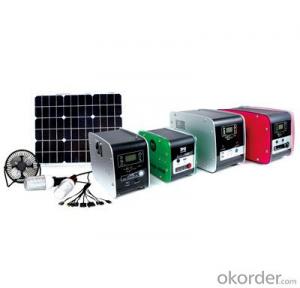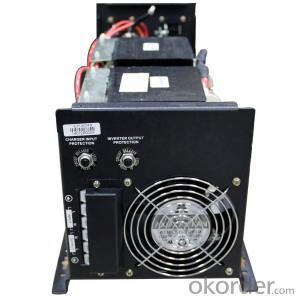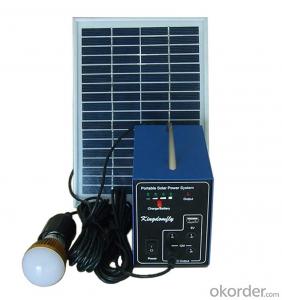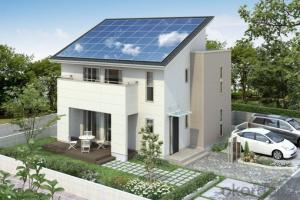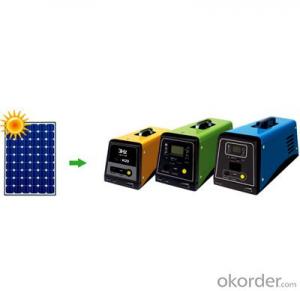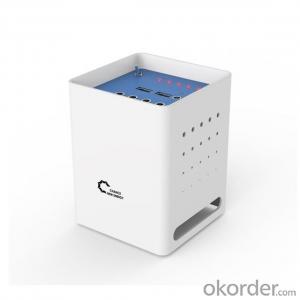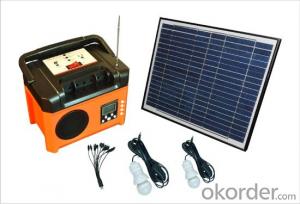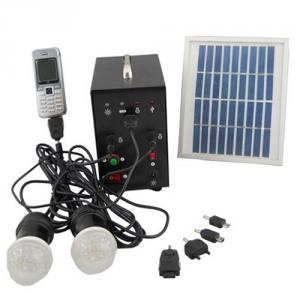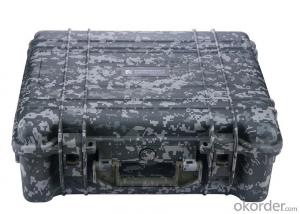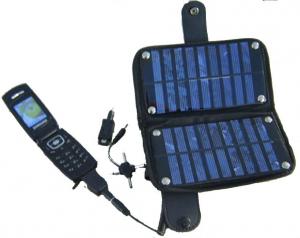Solar Power System/Solar generator portable with MP3/Solar power system free shipping
- Loading Port:
- China Main Port
- Payment Terms:
- TT OR LC
- Min Order Qty:
- -
- Supply Capability:
- -
OKorder Service Pledge
OKorder Financial Service
You Might Also Like
Our new solar power system integrates stereo receiver, MP3 Player with audio speaker. Of course, its basic function is to generate electricity. The solar power system possesses LCD, volume controller, switch, LED indicator light and high-quality audio speaker, etc. It is humanized, energy saving and environmentally friendly. Also, the solar power system is easy to use.
3HZ-HMP30W Solar Power System is specially designed for houses in rural area where grid electricity is unavailable. The system has advantages of automatic self-control and self-protect, best configuration, stable quality, noise-free, easy to install, easy to use, and long-lifetime.
Intelligent Charging Control - The system automates battery charging process in different modes, enhance charge, direct charge or float charge to extend battery lifetime.
Smart Power Supply - The inverter system automates voltage stabilizer, energy-saving compensation, and inverter functions. Multiple DC output options 5V and 12V. 5V DC power is suitable for cellphone charging, and 12V DC power can be used for small electrical appliances. One Direct 220V AC output which is suitable for lighting, television, electric fans and other household appliances.
Energy Saver - When the inverter system detects no AC output for 5 mins, it will shutdown DC - AC inverter feature to minimize internal power consumption.
Smart Soft-Start control - The inverter system is designed to accept high-resistance shock loads to ensure normal startup and power output capability.
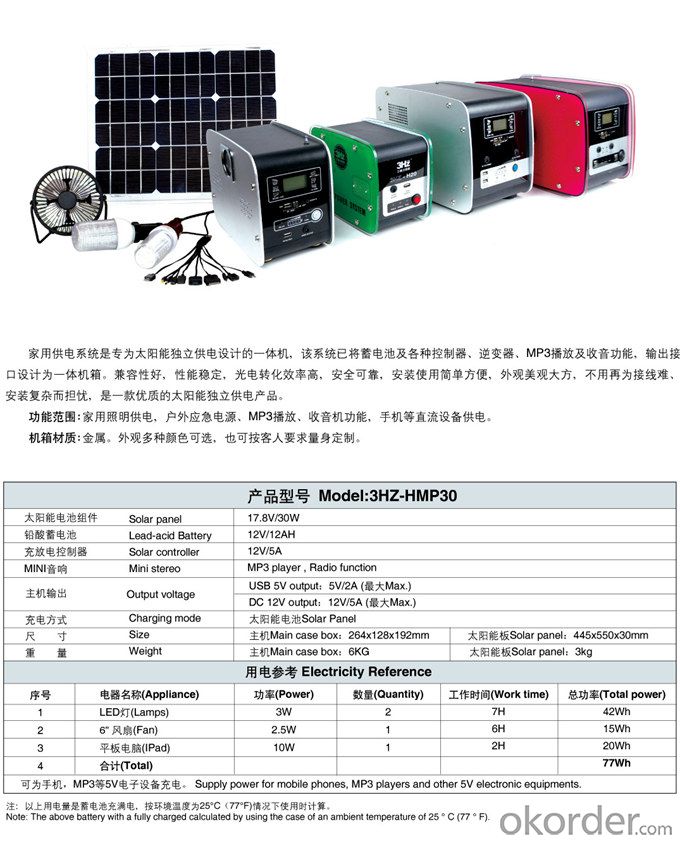
- Q: Are there any environmental benefits of solar energy systems?
- Yes, there are numerous environmental benefits of solar energy systems. Firstly, solar energy is a clean and renewable energy source, meaning it does not emit greenhouse gases or other harmful pollutants into the atmosphere. This helps to reduce air pollution and combat climate change, as solar power generates electricity without any carbon emissions. Moreover, solar energy systems require minimal water usage compared to other traditional forms of energy generation, such as coal or natural gas power plants. This is particularly important in regions facing water scarcity or droughts, as solar power helps to conserve water resources. Additionally, solar energy systems help to reduce reliance on fossil fuels, which are finite resources and contribute to the depletion of natural resources. By generating electricity from sunlight, solar power reduces the need for extracting and burning fossil fuels, conserving these valuable resources for future generations. Furthermore, solar energy systems can be installed on rooftops or in open areas, minimizing the need for large-scale land clearance or habitat destruction. This helps to protect ecosystems and preserve biodiversity. Overall, solar energy systems offer significant environmental benefits by reducing greenhouse gas emissions, conserving water resources, minimizing reliance on fossil fuels, and preserving ecosystems. By transitioning to solar power, we can contribute to a cleaner, more sustainable future for our planet.
- Q: How does the efficiency of solar panels vary with different weather conditions?
- The efficiency of solar panels can vary significantly depending on the weather conditions. This is because the amount of sunlight they receive directly affects their efficiency. Solar panels reach their peak efficiency on clear and sunny days when they receive the maximum amount of sunlight. The direct sunlight allows for optimal conversion of solar energy into electricity, resulting in higher efficiency. However, the efficiency of solar panels decreases on cloudy or overcast days. Clouds block a significant portion of the sunlight, reducing the available energy for conversion. Although solar panels can still generate electricity under cloudy conditions, their efficiency is considerably lower compared to sunny days. Temperature also plays a role in solar panel efficiency. Contrary to popular belief, solar panels actually work more efficiently in cooler temperatures. As the temperature increases, the performance of solar cells decreases due to the temperature coefficient phenomenon. High temperatures reduce the voltage output of solar panels, leading to lower efficiency. While rain or snowfall can impact the efficiency of solar panels, the effect is relatively minimal. Rain temporarily decreases efficiency by reducing the amount of sunlight reaching the panels, but once the rain stops, they return to their normal efficiency. Snow, on the other hand, covers the panels and prevents sunlight from reaching them, resulting in a temporary loss of efficiency until the snow is cleared. In conclusion, the efficiency of solar panels varies with different weather conditions. Clear and sunny days provide optimal conditions for maximum efficiency, while cloudy or overcast days result in decreased efficiency. Temperature fluctuations can also impact the performance of solar panels, with higher temperatures leading to lower efficiency. Rain and snow can temporarily reduce efficiency, but their overall impact is relatively minor.
- Q: Can solar energy systems be used in powering recycling plants or waste management facilities?
- Certainly, recycling plants and waste management facilities can make great use of solar energy systems. These systems harness the sun's power to produce electricity, which can then be utilized to operate various equipment and machinery within these facilities. It is worth noting that these facilities require a significant amount of energy to power their operations, including machines for sorting and processing, conveyor belts, and other equipment. By installing solar panels on the roofs or in close proximity to these facilities, they can generate clean and renewable electricity, thus reducing their dependence on conventional energy sources. Solar energy systems offer numerous advantages for recycling plants and waste management facilities. Firstly, they provide a reliable and consistent source of energy, as the sun is readily available in most regions throughout the year. In contrast to fossil fuels or other non-renewable sources, solar energy systems do not deplete natural resources or contribute to greenhouse gas emissions, making them environmentally friendly. This aligns perfectly with the sustainability goals of recycling plants and waste management facilities, which aim to minimize the environmental impact of waste management processes. Moreover, solar energy systems can help these facilities save on energy costs. Once the initial investment in solar panels is made, the ongoing operational expenses are relatively low. Additionally, certain regions offer incentives and financial support for the installation of solar energy systems, further offsetting the initial investment and making it financially attractive. Furthermore, recycling plants and waste management facilities often possess ample surface areas suitable for solar panel installations, such as rooftops or open fields. This facilitates the installation of a sufficient number of solar panels to meet the energy demands of these facilities. In some cases, surplus energy generated by the solar panels can even be fed back into the electrical grid, enabling the facilities to generate revenue from the excess electricity. In conclusion, solar energy systems can effectively power recycling plants and waste management facilities. They present a sustainable and cost-effective solution, reducing dependence on traditional energy sources while aiding these facilities in achieving their environmental objectives.
- Q: What is the impact of temperature on solar energy system performance?
- The impact of temperature on solar energy system performance is that higher temperatures can decrease the efficiency of solar panels, leading to reduced power output. This is because the materials used in solar panels are sensitive to temperature and can experience a decrease in voltage and current production as temperature increases. Therefore, it is important to consider temperature variations when designing and installing solar energy systems to optimize their performance.
- Q: How do solar energy systems affect air pollution?
- Solar energy systems have a positive impact on air pollution as they produce electricity without emitting harmful pollutants or greenhouse gases. By replacing conventional fossil fuel-based power plants, solar energy systems help reduce air pollution and improve air quality, leading to a cleaner and healthier environment.
- Q: What is the role of solar energy systems in reducing reliance on fossil fuels?
- Solar energy systems play a crucial role in reducing reliance on fossil fuels by harnessing the power of the sun to generate clean and renewable electricity. By utilizing photovoltaic panels or solar thermal systems, solar energy can be converted into electricity or heat without any greenhouse gas emissions or air pollution. This shift towards solar energy helps to decrease the consumption of fossil fuels, which are major contributors to climate change and environmental degradation. Additionally, solar energy systems provide a sustainable and decentralized energy source, reducing the need for centralized power plants and transmission infrastructure. Overall, solar energy systems offer a viable solution to transition towards a more sustainable and fossil fuel-independent future.
- Q: How can solar energy systems reduce electricity bills?
- Generating free and renewable energy from the sun, solar energy systems have the potential to significantly decrease electricity bills. Unlike conventional electricity sources like fossil fuels, solar energy doesn't necessitate ongoing expenses for fuel or maintenance. Once installed, a solar energy system can produce electricity for many years, offsetting a substantial portion of a household's or business's electricity usage. By utilizing the power of the sun, solar energy systems can generate electricity when it is most in demand during daylight hours. Consequently, solar energy can directly compensate for electricity consumption during peak times, diminishing the need to draw power from the grid. Consequently, electricity bills can be drastically reduced or even eliminated, depending on the size and efficiency of the solar energy system. Furthermore, solar energy systems often provide homeowners and businesses with the opportunity to take advantage of numerous financial incentives and programs. These incentives may include tax credits, grants, or policies such as net metering, which allows surplus solar energy to be fed back into the grid and credited towards future electricity bills. These incentives can augment the financial advantages of installing solar energy systems, making them even more cost-effective. Additionally, solar energy systems offer long-term savings. As the cost of electricity from conventional sources continues to escalate, solar energy remains a steadfast and predictable investment. By securing a fixed cost for electricity generation, solar energy systems safeguard against future price hikes and inflation, ensuring that electricity bills remain low and foreseeable for years to come. Overall, solar energy systems provide a sustainable and economically viable solution for reducing electricity bills. By tapping into the abundant and free energy of the sun, households and businesses can enjoy substantial savings, financial incentives, and long-term stability in their energy costs.
- Q: What is the impact of electromagnetic interference on the performance of solar panels?
- Solar panels can be significantly affected by electromagnetic interference (EMI). EMI refers to the disturbance caused by electromagnetic radiation from various sources like power lines, electronic devices, or radio waves. This interference can disrupt the normal functioning of solar panels and decrease their efficiency. The primary effect of EMI on solar panels is the degradation of the photovoltaic cells' ability to convert sunlight into electricity. When exposed to electromagnetic radiation, the cells can become less efficient in converting sunlight, resulting in less power generated. This directly impacts the overall output of a solar panel system and its ability to effectively meet energy demands. Furthermore, EMI can introduce electrical noise into the system, interfering with the required voltage and current levels needed for proper operation. This noise disrupts the control circuits and electronics within the solar panel system, leading to inaccurate measurements and potential malfunctions. In severe cases, excessive EMI can even damage the electronic components of the solar panel, further reducing its lifespan and performance. To minimize the impact of EMI on solar panels, several measures can be taken. Shielding techniques, such as using metallic enclosures or conductive coatings, can reduce the external electromagnetic radiation reaching the solar panels. Additionally, proper grounding and isolation of sensitive electronic components can minimize the interference caused by internal electrical noise. In conclusion, electromagnetic interference can significantly affect the performance of solar panels. It reduces conversion efficiency, introduces electrical noise, and can potentially damage electronic components. By implementing appropriate shielding and grounding measures, the negative effects of EMI can be mitigated, ensuring optimal performance and longevity of solar panel systems.
- Q: Can solar energy systems be used in areas with limited access to sunlight due to tall nearby buildings or trees?
- Solar energy systems require direct sunlight to generate electricity. Therefore, areas with limited access to sunlight due to tall nearby buildings or trees may not be ideal for installing solar energy systems. The shading caused by these structures can significantly reduce the efficiency and effectiveness of solar panels. However, there are alternative solutions such as adjusting the panel placement, using tracking systems, or exploring other renewable energy options that can overcome some of these limitations.
- Q: Can solar energy systems be used for powering electric boats or ships?
- Yes, solar energy systems can be used to power electric boats or ships. Solar panels can be installed on the surface of the boat or ship to capture sunlight and convert it into electricity. This renewable energy source can provide a sustainable and clean power solution for propulsion and other electrical needs on board. However, the effectiveness of solar energy for powering boats or ships may vary depending on the size of the vessel and the availability of sunlight.
Send your message to us
Solar Power System/Solar generator portable with MP3/Solar power system free shipping
- Loading Port:
- China Main Port
- Payment Terms:
- TT OR LC
- Min Order Qty:
- -
- Supply Capability:
- -
OKorder Service Pledge
OKorder Financial Service
Similar products
Hot products
Hot Searches
Related keywords
